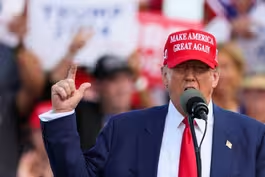
Netanyahu says 'intense' phase of Gaza war will end soon
Clip: 6/24/2024 | 6m 38sVideo has Closed Captions
Netanyahu says Israel may shift focus to Hezbollah in Lebanon after Gaza war ends
Israel indicated it's close to ending what it called the “intense” phase of its operations in Gaza, and would soon transition to a new stage of the war. That word came as Israel’s defense minister met with senior U.S. officials in Washington and as the U.S. and Israel continued a public spat over weapons deliveries. Nick Schifrin reports.
Problems playing video? | Closed Captioning Feedback
Problems playing video? | Closed Captioning Feedback
Major corporate funding for the PBS News Hour is provided by BDO, BNSF, Consumer Cellular, American Cruise Lines, and Raymond James. Funding for the PBS NewsHour Weekend is provided by...

Netanyahu says 'intense' phase of Gaza war will end soon
Clip: 6/24/2024 | 6m 38sVideo has Closed Captions
Israel indicated it's close to ending what it called the “intense” phase of its operations in Gaza, and would soon transition to a new stage of the war. That word came as Israel’s defense minister met with senior U.S. officials in Washington and as the U.S. and Israel continued a public spat over weapons deliveries. Nick Schifrin reports.
Problems playing video? | Closed Captioning Feedback
How to Watch PBS News Hour
PBS News Hour is available to stream on pbs.org and the free PBS App, available on iPhone, Apple TV, Android TV, Android smartphones, Amazon Fire TV, Amazon Fire Tablet, Roku, Samsung Smart TV, and Vizio.
Providing Support for PBS.org
Learn Moreabout PBS online sponsorshipGEOFF BENNETT: Welcome to the "News Hour."
Israel today indicated it's close to ending what it called the intense phase of its operations in Gaza and would soon transition to a new stage of the war.
That word came as Israel's defense minister met with senior U.S. officials here in Washington today and as the U.S. and Israel continued a public spat over weapons deliveries.
Nick Schifrin joins us now.
Nick, it's good to see you.
So what did Israel say about the future of the war?
NICK SCHIFRIN: Geoff, for months, Israel has described its operation in Rafah as targeting the final four Hamas battalions.
And, today, Israel's chief of the general staff said that Israeli soldiers in Rafah were -- quote -- "approaching the point" where Hamas' Rafah brigade was -- quote -- "defeated."
And, as you said, Geoff, just now, Netanyahu described that as a transition from the intense phase of combat, allowing Israel to shift its focus to the north, to Lebanon.
There has been an extraordinary amount of U.S. concern in the last few weeks about cross-border fire between Israel and Hezbollah in Lebanon becoming a full-scale war.
And, this weekend, C.Q.
Brown, the chairman and the Joint Chiefs of Staff, warned that Iran could come to Hezbollah's aid if there were a war between Israel and Hezbollah and that the U.S. could not defend Israel like it did against Iran's attack in April if Hezbollah actually opened fire against Israel, a warning sign, another warning sign, by U.S. officials, who are really concerned about escalation, but U.S. officials insist that they will help Israel defend against all enemies.
GEOFF BENNETT: On the point of escalation, the U.S. has said that the best way to prevent an expansion of the war is to get a cease-fire in Gaza.
So where do things stand on that front?
NICK SCHIFRIN: Regional officials tell me that they are still trying to bridge the gaps between Israel and Hamas, but there's been no public progress.
There's also been public doubts, as you and I have talked about, Geoff, about whether Israel, whether Prime Minister Netanyahu would actually endorse the deal that President Biden laid out that he said was actually created by Israel.
And in the last 24 hours, Netanyahu has made no fewer than three contradictory statements about the hostage negotiation, including on Israeli TV last night.
BENJAMIN NETANYAHU, Israeli Prime Minister (through translator): I am not willing to stop the war and leave Hamas intact.
I am prepared to make a partial deal, this is no secret, that will return to us some of the people, but we are committed to continuing the war after a pause in order to complete the goal of eliminating Hamas.
NICK SCHIFRIN: That is the first time the Netanyahu used the phrases partial deal or some hostages, suggesting he was walking back his own plan, which calls for the release of all 120 hostages currently held in Gaza and the negotiation toward a permanent cease-fire.
Now, last night, after his interview on TV, he walked that statement back, saying -- quote -- "It is Hamas which opposes a deal, not Israel.
Prime Minister Netanyahu has made it clear he will not leave Gaza until we return all 120 of our hostages, living and deceased."
That was last night.
And, today, he further walked his Sunday comments back.
We BENJAMIN NETANYAHU (through translator): We are committed to the Israeli proposal that President Biden welcomed.
Our position has not changed.
NICK SCHIFRIN: So, three statements, all in all, in 24 hours.
That left a rather bemused State Department spokesman, Matt Miller, to respond this way today.
MATTHEW MILLER, State Department Spokesman: I think all of us that speak publicly at times make mistakes and misspeak.
And when we do so, we have an obligation to come clarify, and we're glad he did.
NICK SCHIFRIN: So, at the end of the day, Geoff, I guess we are where we were, which is that a hostage deal endorsed by Israel, made public by President Biden, negotiators continue to try and figure out the gaps since Hamas proposed changes.
Hamas itself said that Netanyahu's Sunday comments means he doesn't want this deal.
And the hostage families, I should add, said that those Sunday comments indicated Netanyahu was -- quote -- "abandoning the hostages."
GEOFF BENNETT: Wow.
Well, meantime, he has accused the U.S. on multiple occasions of withholding weapon deliveries.
Is that the case?
NICK SCHIFRIN: Well, look, U.S. officials insist they have frozen only one weapon delivery, 3,500 bombs that are unguided, and that was back in May.
But a U.S. official does describe this process, that, after October the 7th, Israel and the United States worked together, and they went back and found many Israeli weapons purchases, some of them many years old, that hadn't yet actually been delivered.
And what they did is, they worked to actually deliver all of those previous purchases, and that did increase the pace of weapons deliveries to Israel to an unprecedented level for, frankly, an unprecedented level of munitions that Israel was asking for in order to prosecute their war in Gaza.
But once those orders were fulfilled, they had to create new orders through the U.S. government or through the defense contractors, and that takes time between the administration, between those defense contractors, and the notifications to Congress.
And so the pace of delivery, according to this U.S. official who works on this, is slower than it was after October the 7th.
But the U.S. strongly denies it is withholding weapons, and it believes that Netanyahu knows that.
And so most analysts I talk to say that Netanyahu is playing domestic politics here with this accusation, including with Defense Minister Yoav Gallant, who happens to be in Washington now.
And you see them -- you see him meeting Secretary of State Antony Blinken.
Today, he later met with CIA Director Bill Burns.
Now, Gallant is a political rival to Netanyahu, and the two could fight over taking credit for any weapons deliveries that do come out of the U.S. in the coming weeks.
And Netanyahu, as we have talked about before, has a right-wing coalition.
He needs to stay in power, and doing so, or at least the political decision-making that he's been making with this right-wing coalition since October the 7th, is, he works with the right-wing, and he criticizes President Biden publicly.
And that has been a winning formula, he believes, that could keep in power -- keep him in power, especially as he continues to face years-old corruption cases, Geoff, including one today.
A panel accused him of undermining Israeli national security in a case involving submarines.
That is a charge that he denied yet again today.
GEOFF BENNETT: Nick Schifrin, got to say, thank you for walking us through all of this.
We deeply appreciate it.
NICK SCHIFRIN: Thanks very much.
Amy Walter and Francesca Chambers on debate expectations
Video has Closed Captions
Clip: 6/24/2024 | 8m 8s | Amy Walter and Francesca Chambers on expectations for the Biden-Trump debate (8m 8s)
Cyberattack disrupts business at thousands of car dealers
Video has Closed Captions
Clip: 6/24/2024 | 6m 25s | Cyberattack on software company disrupts business at thousands of car dealerships (6m 25s)
Loss of major water source threatens Great Plains farming
Video has Closed Captions
Clip: 6/24/2024 | 8m 16s | Depletion of major groundwater source threatens Great Plains farming (8m 16s)
'Monuments of Solidarity' highlights activism in art
Video has Closed Captions
Clip: 6/24/2024 | 7m 11s | 'Monuments of Solidarity' exhibition highlights an activist's approach to making art (7m 11s)
N.Y. primary reflects Democratic divide over Israel support
Video has Closed Captions
Clip: 6/24/2024 | 2m 49s | New York primary race reflects Democratic Party divide over Israel support (2m 49s)
Trump vows to defund schools requiring vaccines for students
Video has Closed Captions
Clip: 6/24/2024 | 6m 28s | Trump vows to defund schools requiring vaccines for students if he's reelected (6m 28s)
Providing Support for PBS.org
Learn Moreabout PBS online sponsorship
- News and Public Affairs

FRONTLINE is investigative journalism that questions, explains and changes our world.

- News and Public Affairs

Amanpour and Company features conversations with leaders and decision makers.












Support for PBS provided by:
Major corporate funding for the PBS News Hour is provided by BDO, BNSF, Consumer Cellular, American Cruise Lines, and Raymond James. Funding for the PBS NewsHour Weekend is provided by...





